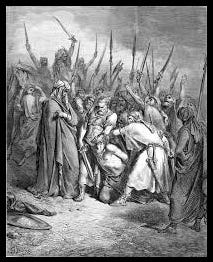Gog u’Magog Now — Genocide Later
Some notes toward a better understanding of the practical fulfillment of the Amalekite Mitzvah
Between Shabbat Zachor and Purim, a little heart-to-heart on the matter is in order, no…?
And yet, before we get there, perhaps a brief word of introduction is also necessary.
Many ostensibly believing Jews see the mitzvah of Amalek as a non-starter.
They’ll tell you ‘we have no clue who Amalek is today’.
They’ll tell you ‘Amalek lives within us’ – as doubt, and nothing more.
They’ll tell you the whole story is just a mashal to help us understand the need to learn Torah and perfect our avodah, the better to succeed in the spiritual wars of this world.
And, indeed, we concur; all those positions are valid.
But they don’t obviate the need to fulfill the mitzvah as it’s written and as Rashi explains it, any more than the lack of an available red heifer today cancels the mitzvah of the parah adumah.
For that would be absurd.
And at Save The Hilltop Youth, we don’t do absurd.
So let’s take a look —
1. At the mitzvah as it is written in Devarim 25:17-19.
2. Then at Rashi, to get a notion of what pshat is.
3. Then again at pasuk 19 – where some odd language needs clarification.
4. And finally at Rav Kahane’s Perush HaMaccabi.
And be warned – this is not a post for Jews whose hearts grow flaccid at the thought of full mitzvah observance.
You shall remember what Amalek did to you on the way, when you went out of Egypt, how he happened upon you on the way and cut off all the stragglers at your rear, when you were faint and weary, and he did not fear G-d.
[Therefore,] it will be, when the Lord your G-d grants you respite from all your enemies around [you] in the land which the Lord, your G-d, gives to you as an inheritance to possess, that you shall obliterate the remembrance of Amalek from beneath the heavens. You shall not forget!
Fair enough.
And now Rashi on You shall obliterate the remembrance of Amalek –
Both man and woman, infant and suckling, ox and sheep [camel and donkey] (G-d’s command to King Saul: see I Sam. 15:3), so that the name of Amalek should never again be mentioned (נִזְכָּר), from the word (זֵכֶר), even regarding an animal, to say: “This animal was from Amalek.” - [Midrash Lekach Tov]
Alright. So pshat involves some blood-letting.
No great surprise.
Animals, too, hunh?
Tov.
Onward.
Back to the Torah…
There’s some peculiar language in the final pasuk (v. 19) of the Amelekite mitzvah, that, in our opinion, does not garner sufficient scrutiny.
Very few commentators address the language – וְהָיָה בְּהָנִיחַ ה' אֱלֹקיךָ לְךָ מִכָּל אֹיְבֶיךָ מִסָּבִיב – “when the Lord your G-d grants you respite from all your enemies around [you]”…
And that’s unfortunate, because therein lies the crux of the mitzvah – its timing – which also sheds light on the identity of Amalek.
Consider –
There will come a time when Hashem permits us peace from all our enemies m’saviv.
When?
Directly after the War of Gog u’Magog, when the nations of the world learn (the hard way) not to mess with the Al-mighty.
And when that happens – when all our enemies m’saviv have been dealt their final death blow – do you think for a moment there will still be non-Jews within Eretz Yisrael to battle?
Is it conceivable that they would refrain from joining the assault when the hordes of Gog u’Magog come streaming toward Jerusalem?
Of course, anything is possible. But to imagine that the local Arab population (or any others hostile to an exclusive Jewish presence in the Land of Israel) would hold off fighting while the rest of the world took up arms in a final clash against G-d and His Torah — well, that stretches the limits of plausibility to the extreme.
That is to say, when Hashem “grants us respite from all our enemies m’saviv”, it means there will be no enemies remaining to fight.
And yet according to the pasuk, Amalek will still remain.
So who could he be…?
Hmmm…
The Ibn Ezra proves helpful.
He writes that the mitzvah of Amalek is dependent upon Israel’s complete inheritance of the Land of Israel and there being thereafter a cessation of war altogether.
“All the while,” he writes, “that Israel is busy with war from without… there is no obligation to battle Amalek.”
The so-called ‘war’ against Amalek – the massacre of every man, woman, child and beast owned by that people – will therefore come about after the need for war has passed.
When no enemy at all remains.
Strange…
And so who is Amalek?
Rav Kahane, as usual, brings his hammer to the matter.
He writes that the war against Amalek is different from all other wars, in that it is neither a war of defence nor of conquest of the Land [of Israel]. It is a war of Kiddush Hashem – and nothing else.
And that is why it must come after the need for wars has passed.
Says Rav Kahane –
“We need to wait davka until we’ve conquered the land, and the victory over all our enemies is absolute – such that no greater proof exists of Hashem’s kingship or His omnipotence, nor of any force that might stand against Him.”
“And then,” writes the Rav, the mitzvah is simply to “blot out the memory of anyone who disputes this.”
Ho, ho, friends…
The Erev Rav — should they somehow remain to see that great and glorious day of Hashem — they will have to be brought low.
For it is a mitzvah d’oraita.
Dean Maughvet.
Please consider sharing this post with like-minded travelers. And may the G-d of Israel ever show you favor.





